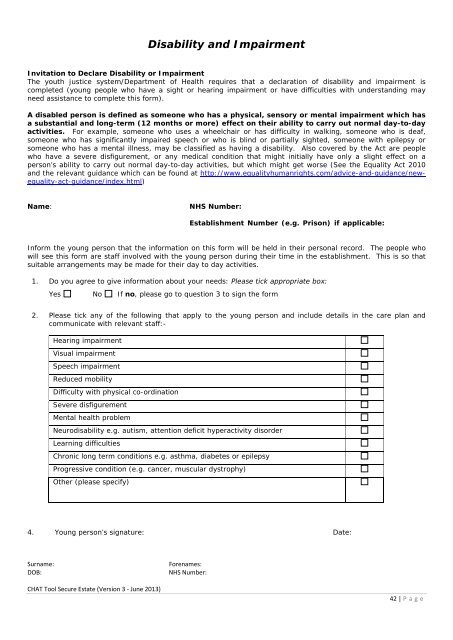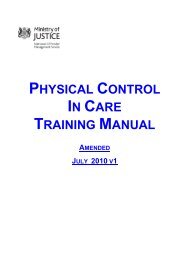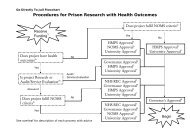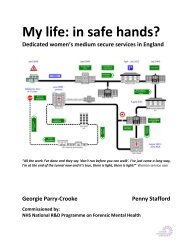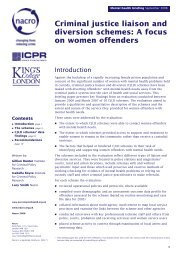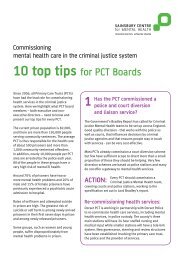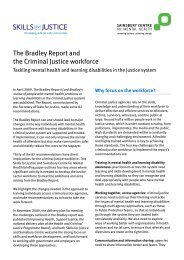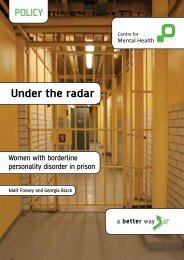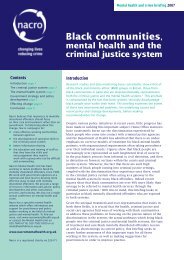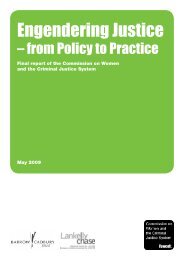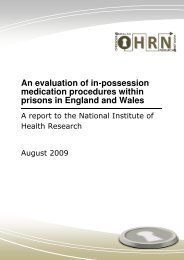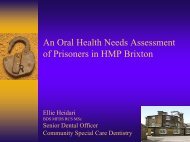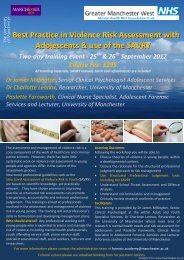CHAT Tool - Offender Health Research Network
CHAT Tool - Offender Health Research Network
CHAT Tool - Offender Health Research Network
You also want an ePaper? Increase the reach of your titles
YUMPU automatically turns print PDFs into web optimized ePapers that Google loves.
Disability and Impairment<br />
Invitation to Declare Disability or Impairment<br />
The youth justice system/Department of <strong>Health</strong> requires that a declaration of disability and impairment is<br />
completed (young people who have a sight or hearing impairment or have difficulties with understanding may<br />
need assistance to complete this form).<br />
A disabled person is defined as someone who has a physical, sensory or mental impairment which has<br />
a substantial and long-term (12 months or more) effect on their ability to carry out normal day-to-day<br />
activities. For example, someone who uses a wheelchair or has difficulty in walking, someone who is deaf,<br />
someone who has significantly impaired speech or who is blind or partially sighted, someone with epilepsy or<br />
someone who has a mental illness, may be classified as having a disability. Also covered by the Act are people<br />
who have a severe disfigurement, or any medical condition that might initially have only a slight effect on a<br />
person’s ability to carry out normal day-to-day activities, but which might get worse (See the Equality Act 2010<br />
and the relevant guidance which can be found at http://www.equalityhumanrights.com/advice-and-guidance/newequality-act-guidance/index.html)<br />
Name:<br />
NHS Number:<br />
Establishment Number (e.g. Prison) if applicable:<br />
Inform the young person that the information on this form will be held in their personal record. The people who<br />
will see this form are staff involved with the young person during their time in the establishment. This is so that<br />
suitable arrangements may be made for their day to day activities.<br />
1. Do you agree to give information about your needs: Please tick appropriate box:<br />
Yes No If no, please go to question 3 to sign the form<br />
2. Please tick any of the following that apply to the young person and include details in the care plan and<br />
communicate with relevant staff:-<br />
Hearing impairment<br />
Visual impairment<br />
Speech impairment<br />
Reduced mobility<br />
Difficulty with physical co-ordination<br />
Severe disfigurement<br />
Mental health problem<br />
Neurodisability e.g. autism, attention deficit hyperactivity disorder<br />
Learning difficulties<br />
Chronic long term conditions e.g. asthma, diabetes or epilepsy<br />
Progressive condition (e.g. cancer, muscular dystrophy)<br />
Other (please specify)<br />
4. Young person’s signature: Date:<br />
Surname:<br />
DOB:<br />
Forenames:<br />
NHS Number:<br />
<strong>CHAT</strong> <strong>Tool</strong> Secure Estate (Version 3 - June 2013)<br />
42 | P age


